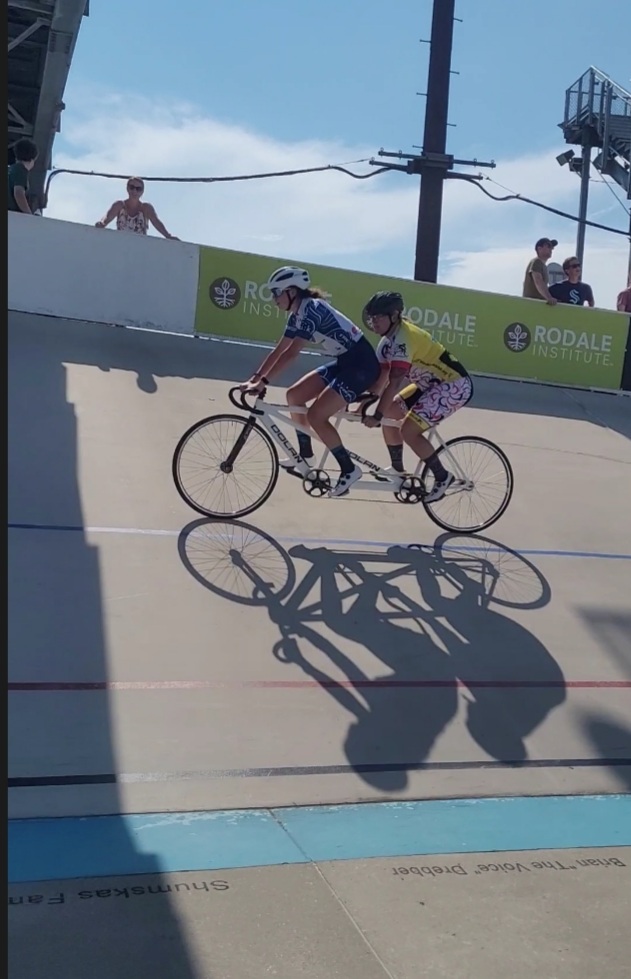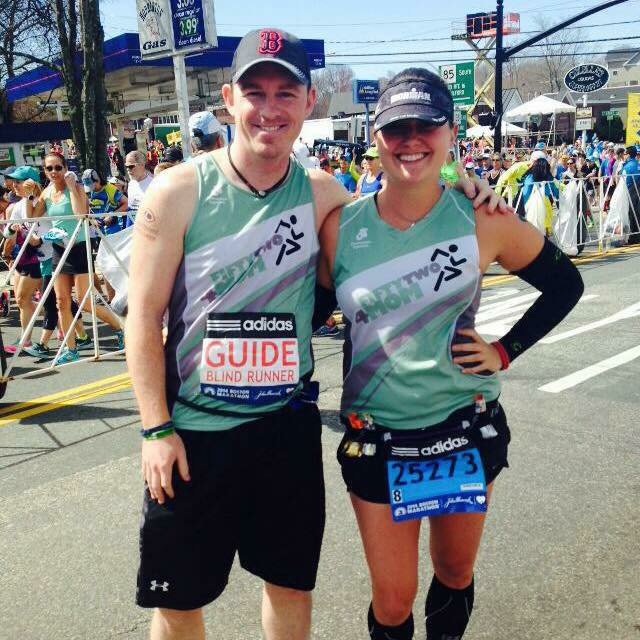How a college professor inspired this deaf-blind woman to become a triathlete.

While earning her master’s degree in counseling at the University of South Florida, Rachel Weeks was sitting in a classroom one day in 2006 listening to a professor talk about her experiences as an Ironman triathlete.
Weeks, a native of Nashville who now resides in Bradenton, Florida, listened with rapt attention as the professor, who was in her sixties, told her story. She described how she lost weight, overcame a drinking problem, got a Ph.D. and completed a triathlon that consisted of a 2.4-mile swim, 112-mile bike ride and 26.2-mile run.
I want to do that, Weeks thought to herself.
At the time, Weeks was six months pregnant with her first child. She was also visually and hearing impaired. Competing in an Ironman competition seemed lightyears away.
It took nearly six years, but Weeks participated in her first marathon, the California International. In 2013, she completed the Texas Ironman competition, and has competed in other races including two Boston Marathons.
“Her story was just incredible,” the 39-year-old Weeks recalled of her professor. “She started talking about Ironman and how she used to be 200-plus pounds. This lady was a little thing. It was hard to see her and that transformation. She’d bring in her food and talk about training. I was mesmerized. She definitely inspired me.”
At age two, Weeks was diagnosed with hearing loss, although doctors were baffled by the cause. It wasn’t until she began experiencing vision loss at 19 that a diagnosis was finally found. Weeks had a genetic condition called Usher Syndrome, which causes deafness or hearing loss and the eye disease retinitis pigmentosa.
As a child, the hearing loss didn’t prevent Weeks from achieving success in the classroom and sports. She wore hearing aids, took speech therapy and participated in dance, gymnastics, horseback riding and other sports. She endured varying degrees of bullying, indifference and acceptance. But sports gave her a sense of self-worth and a realization there were no barriers.

In 2013, Weeks became the first athlete with Usher Syndrome to compete in Ironman Texas. It was a 17-hour race and her biggest competition to date. She was able to finish with minutes to spare. It was especially gratifying after suffering double stress fractures in her tibia the year before while running the California International Marathon. But thanks to dieting and a physical therapist, Weeks was able to heal in time for the Ironman competition.
“There were so many battles won that day. I thought the pain was normal. My doctor literally told me never to run again. I had already signed up for Texas Ironman. I was like, ‘are you kidding? You can’t do this to me’.” I went in for X-rays, and they just couldn’t believe how quickly I had healed.”
Weeks recently decided to concentrate solely on cycling due to the constant pain in her legs and feet from running. She became acquainted with Foreseeable Future Foundation CEO Griffin Pinkow after the two attended several track camps together. She applied for a scholarship to cover the cost of attending USA Cycling Para National Championships.
Weeks was particularly grateful to receive the scholarship after discovering she would have to pay for her guide as well.
“Typically, when you enter a triathlon, you don’t have to pay for your guide. The guide is part of your equipment, so to speak. Unfortunately, USA Cycling doesn’t see it that way. That was an expense I wasn’t expecting, so the scholarship was very welcome.”
Along with her teenage daughters Audrey and Hailey, Weeks is expecting her third child. As she enters her forties, she hopes to continue to be active in sports.
“I’m not trying to limit myself, because it’s easy to do that. When I think maybe my best days are over, I see other people completely stepping out of that box and I think, ‘nope, not really’.”
“It instills that confidence no matter where you are in life. I see it in my girls (Audrey and Hailey), I feel it in me.”
After she began losing her vision, Weeks was persuaded by her younger sister Rebecca to take part in a half marathon she had signed up for. That’s when she discovered blind and visually impaired athletes could run with a guide. Rebecca agreed to be her guide for the race, which took place about a year after Rachel had her second daughter.
“Neither of us knew what we were doing. Of course, I’m the older, bossy sister. The online presence on Facebook definitely helped us work through the rookie mistakes of the guide-athlete pairing. We had a really great race.”
When Weeks finally got the opportunity to train for triathlon and Ironman competitions, she already had experience in running, having competed in several other races since that first half marathon. Swimming and cycling would be a bigger learning curve, particularly as a visually impaired athlete. She swam as a child, but it had been a while since she had done anything serious in a pool. She recalled her first training attempt.
“That first length of the pool I was so winded, so tired. Unfortunately, the pool I chose was very busy, and trying to do that with no peripheral vision got very frustrating. But I’ve since learned to speak up and do those kind of things. Re-learning how to do laps was tough.”
Weeks eventually became comfortable swimming with a tethered guide. Cycling was also a challenge, particularly when it came to finding the right bike.
“Now, it’s a lot easier. We have a lot more resources out there. But trying to find the right one, figuring out how to ship it was so difficult.”
